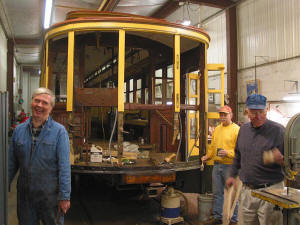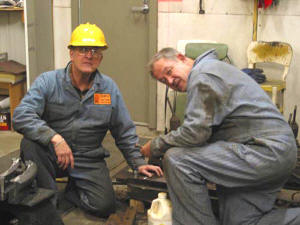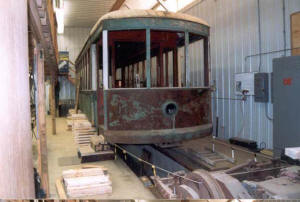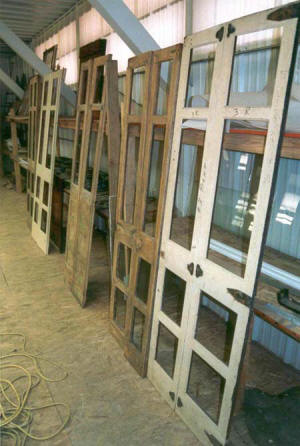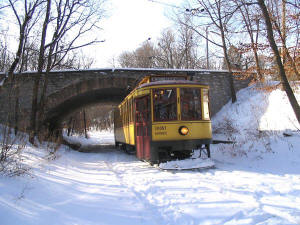| RyPN Briefs March 10, 2005 |
|
|
Women in Railroading
In celebration of Women’s History Month, the
Forney Museum of
Transportation, located in Denver, Colorado is pleased to host
“Women in Railroading,” an interpretive exhibit produced by the
International
Society for the Preservation of Women in Railroading. It is not
readily known that railroads have employed women since 1838 through to the
present time. This exhibit showcases some of these women’s contributions
to railroad history.
The exhibit includes six themed panels.
- Women of War: Rosie the Riveter/WWI and WWII
- The Harvey Girls: Waitresses for the Fred Harvey Company
- Phoebe Snow: Fictional Advertising Character for the DL &W
- Kate Shelley: Hometown Hero 1881 who Saves a Train and Workers
- Mary Colter: Architect for the Santa Fe Railway and Fred Harvey Company
- Nurses/Stewardesses: Predecessors to Airline Stewardesses
The exhibit is open and free to the public from 9 a.m. to 5 p.m., Monday through Saturday the entire month of March. For more information call 303.297.1113 or email at fmdirector@forneymuseum.com.
(Forney Museum press release)
Minnesota Streetcar Museum News
Although the Minnesota Streetcar Museum is a new non-profit corporation that many of you might not have heard of, the Museum is the lessor and operator of the well-known Como-Harriet Streetcar Line, located in southwest Minneapolis and the lesser-known Excelsior Streetcar Line, which run on a half-mile of track in the suburban city of Excelsior, located about 15 miles west of Minneapolis.
|
|
| An historic occasion. The first called Board of Directors meeting of the newly formed Minnesota Streetcar Museum was held on January 15, 2005. The meeting was held aboard TCRT streetcar No. 1300 (TCRT Snelling Shops, 1908), one of only two Twin City streetcars preserved with their original mechanical and electrical apparatus. Seashore Trolley Museum in Maine has the other one, No. 1267 (TCRT Snelling Shops, 1907). Shown from left to right are (seated) Scott Heiderich and Greg Taylor, (standing) Rod Eaton, Jim Vaitkunas, Jerry Olsen, Louis Hoffman and John Prestholdt, (kneeling) Keith Anderson, (seated) Dave French and Howie Melco. |
In the most sweeping organizational overhaul in its 43 years, the Minnesota Transportation Museum’s (MTM) Board of Directors authorized, and the membership overwhelmingly ratified, a reorganization of MTM that will result in its traction-related assets being managed by and transferred to the new Minnesota Streetcar Museum, incorporated late last year. The Museum’s steamboat assets will similarly be transferred to the Museum of Lake Minnetonka. Essentially, MSM is the old Traction Division of the Minnesota Transportation Museum.
This action recognizes that one Board, especially a volunteer one, no matter how talented and well intentioned, cannot successfully manage six exhibit sites with divergent philosophies operating boats, buses, trains, and trolleys, not to mention two static display museums, spread over such a large geographical area.
MSM’s 2005 goals are to get the new corporation up-and-running, complete
the transfer of assets from MTM upon receipt of MSM’s tax-exempt status
under section 501(c)(3) of the Internal Revenue Code (anticipated later
this year), see the TEA-21 track reconstruction project through to
completion before winter, and complete the integration of the Excelsior
Streetcar Line into Como-Harriet procedures. On tap for 2006 will be
sorting through, prioritizing, and implementing targeted marketing ideas,
focusing on charters, groups, and special events, to increase revenue, and
bringing educational programs to the fore.
For membership information, please contact MSM at P. O. Box 14467,
University Station, Minneapolis, Minnesota 55414-0467.
Shop Update
For the past 25 years or so the pattern of activity in the shops at Lake
Harriet, and more recently at Excelsior, has not varied much. Between the
end of one operating season and the beginning of the next, much work gets
done in the confines of our shop buildings. During the winter of 2004-2005
the focus of our maintenance and restoration activities have been in the
Linden Hills carbarn.
A lot of work has been done on the rear platform area of TCRT No. 1300 (TCRT Snelling Shops, 1908). After the exterior wood siding and the interior panels were removed the steel members of the platform were inspected and found to be in decent shape. Some of the wood was found to be rotted and needed replacing. The steel was treated and painted and the platform is now being rebuilt. Work is also on-going to restore the magnetic track brakes on TCRT PCC No. 322 (St. Louis Car Co., 1947) so that they function properly.
Work on single-truck city car, Winona No. 10 (St. Louis Car Co., 1914) has slowed as the priority of the shop work is on No. 1300 and PCC No. 322. However, work on Winona No. 10 has not entirely stopped. The carbody was levelled and sturdy support cribbing placed along each side of the car by Ken Albecht. This is necessary so cutting out of rusted bottom portion of the steel side sheets can be done without disturbing the plumb and level of the car. Bob Dumas, Bill Graham and George Ittner continued their great work on the stripping and repairs to the window sash and the folding doors. Preliminary work on tracing the interior wiring of the car is being done by Neil Howes and several others from the “Tuesday Boys” work crew.
Como-Harriet Streetcar Line Update:
TEA-21 contracts over budget; project to be re-bid
The Minnesota Dept. of Transportation and the Federal
Highway Administration approved the project memorandum followed by
approval of the final plans and specifications. After opening the bidding
process in December, bids were opened on February 1 and all were over the
grant amount. After consultation with our consulting engineers, SRF, the
bidding process is starting over again. This means that some less
essential but nice elements of the project may be cut, that the
specifications may be lower, and that we may have to be less particular
about when the work is done (we had specified completion by the beginning
of the season). This could affect summertime operations and, of course,
income. And it’s still possible that the work could be done in the Labor
Day to Halloween slow period. But the end result will be, at a minimum, a
completely rebuilt railroad. The current plan is that the work will be
done by the onset of this winter.
Como-Harriet Mail Bag
In 2004 The Como-Harriet Streetcar Line had visitors from 36 states and
the territory of Guam and thirteen foreign countries: Australia, Canada
(British Columbia and Saskatchewan), Chile, Colombia, Czech Republic,
France, Germany, Ireland, Japan, Malaysia, Mexico, Peru, and the United
Kingdom. We also had members of the
Pennsylvania Trolley Museum and the
South Carolina Railroad Museum visit us.
Among the visitors' comments: “Thoroughly enjoyed the ride and the history.” “It’s a great experience for a kid. My children love the streetcar. Also the drivers are so nice. They do such great work with the children. Congratulations for such an excellent service.” “Great to ride on a PCC again.” (from Portland, Maine) “The PCC restoration is A+ (from Seattle) “That was the coolest thing ever.” “Now I get a feel for what my Mom rode when she went to St. Paul Central High School.” “We’ve been riding for years.” “I grew up half a block from the Hamline line – some 50-60 years ago – somehow residual spikes found their way into my sandbox!” “Nice Memorial Day finale.” “The dogs loved it.” “Been riding for 33 years.” “We will be back!” “Tres bien.” (from France) “Loved it. Thanks for volunteering.” And my favorite, from our neighbors Park Board Superintendent Jon and his wife Randee Gurban: “We love you guys. Thanks!”
Excelsior Streetcar Line Update
This season, operations will start in early May rather than mid to
late-May. In addition, Thursday operations, our most popular because of
the adjacent Excelsior Farmer’s Market, will see service start at 2:00
p.m., one hour earlier, to correspond to Market hours. When crews started
early last year, they were always busy from the get-go – no sense waiting
until 3:00! In addition, we’re planning on three-person crews on Thursdays
and at special events, adding a platform attendant to sell tokens “on the
ground” to keep the car moving, rather than the conductor selling fares
after discharging passengers from the previous trip, which delays the
start of the next trip. We’re also expecting a boost in ridership this
year as a result of closer cooperation between the Museum and the
Excelsior Chamber of Commerce and the
Excelsior-Lake Minnetonka Historical
Society, whose museum, in the old Minneapolis and St. Louis station, is
adjacent to the Water Street platform.
(Louis Hoffman and Jim Vaitkunas)
